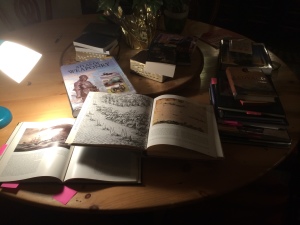A guest post by Guy Anthony DeMarco.
With the holiday season in full swing, many folks decide to make a resolution for the upcoming New Year. With this in mind, here are several ideas to consider for 2015.
- Resolve to Write.
Sometimes it seems silly to tell writers that they should write. Too many of them finish a big project, such as a novel, and spend far too much time tweaking, publishing, and promoting their book. Yes, these are important details, but the majority of your time should be spent writing your next book. If you have only four hours to devote to writing a day, three and a half should be spent on writing. As Dean Wesley Smith said, be a writer (one who writes) versus be an author (one who has written). The best way to be noticed is to have a large assortment of items for sale. Each book is a hook on a line. If you have one hook in the water, you may catch a fish. If you have twenty hooks in the water, the odds are a fish will notice one of those juicy worms and you’ll be dining on fish tonight.
- Resolve to Complete Projects.
If you’re like me, you have dozens of half-finished projects that are taking up space on your hard drive. Make a decision to pick some of them and get them completed and in the marketplace. If you decide to take on a project, resolve to get it done, barring emergencies or medical disasters. A half-written project of 20K words is wasteful, so go over it, replot if necessary, and get it out the virtual front door.
- Resolve to Learn About Writing.
There are quite a few blogs and websites that can keep you in touch with what’s happening in the marketplace. Ralan’s and Duotrope can help you spot markets that are open for submissions. Joe Konrath, The Passive Guy, and Hugh Howey have excellent blogs concerning self-publishing. Local conventions usually have a writing track, so bring a notepad and take notes. If you’re new to the Fictorians, go through the archives and see what catches your attention. Buy a book or three about writing, then actually read them. If you write off of the top of your head (aka a Pantser) or go through great troubles to plot out every detail of your story (aka an Plotter/Outliner), take some time to try out the other method. I personally find it’s easier to be a Pantser when writing short stories and flash fiction, but for a complex story or a novel, being an Outliner comes in handy.
- Resolve to Learn About the Business of Writing.
This is a big resolution, and it will certainly take some time over 2015 to complete. The good thing is it can be easily done if you nibble on the elephant, one bite at a time.
Probably the easiest way to cover this resolution is to attend a seminar or workshop dealing with the business side of writing and publishing. The aforementioned Dean Wesley Smith conducts workshops on the west coast with his brilliant wife Krisine Kathryn Rusch. Kevin J. Anderson and Rebecca Moesta run a seminar on the writing and publishing business each year in Colorado Springs, Colorado, called the Superstars Writing Seminar. The date for next year is February 5-7, 2015, and will feature Kevin, Rebecca, Jody Lynn Nye, James Artimus Owen, Eric Flint, Toni Weisskopf, and a host of additional top authors and editors. They cover everything you could ever wish to learn from award-winning professionals.
There are dozens of books on the business side of writing. While anyone can write a book and publish it, make sure the author has extensive experience before commiting to reading an advice-centric book. Dave Farland has several excellent books (not to mention an excellent free blog), and Wordfire Press in particular has a wide variety of business advice books.
- Resolve to Learn About Copyrights.
This is a smaller resolution, one which every writer should know. There are plenty of folks who give bad advice on copyrights because they’re only parroting what they heard—and they heard it from someone who also didn’t have a clue.
In my opinion, the best book on copyrights is published by Nolo Press. It’s a longish book, but you will know exactly what a copyright is when you’re done. It would be a safe bet that you’d learn something new—something that contradicts what you believed for a long time—when you learn about what a copyright is and is not. For example, many new authors are convinced that copyrights cover ideas. They don’t—they only cover the execution of an idea, such as a finished book.
Take the time to learn how to be a professional writer and author. Not only will it help you avoid the pitfalls on your career path, but it will make your journey more enjoyable.
About the Author:
Guy Anthony De Marco is a speculative fiction author; a Graphic Novel Bram Stoker Award®; winner of the HWA Silver Hammer Award; a prolific short story and flash fiction crafter; a novelist; an invisible man with superhero powers; a game writer (Sojourner Tales modules, Interface Zero 2.0 core team, D&D modules); and a coffee addict. One of these is false.
A writer since 1977, Guy is a member of the following organizations: SFWA, WWA, SFPA, IAMTW, ASCAP, RMFW, NCW, HWA. He hopes to collect the rest of the letters of the alphabet one day. Additional information can be found at
Wikipedia,
GuyAndTonya.com, and
GuyAnthonyDeMarco.com.


